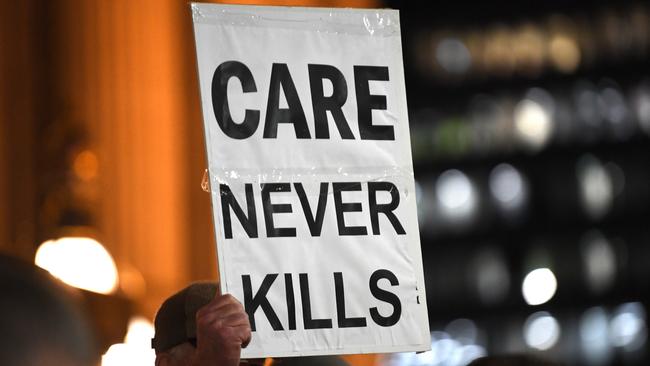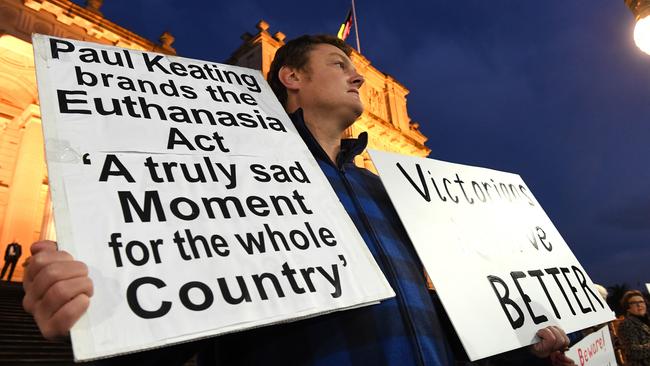Euthanasia isn’t dying with dignity, it’s suicide
Part of the pitch for euthanasia is that we should humane and progressive enough to be able to help people die when they no longer want to live. But, as a society, aren’t we supposed to be against suicide, asks Peta Credlin.
There’s a world of difference between keeping alive someone who would otherwise be dead and killing someone who would otherwise be alive; and between easing someone’s pain and ending a life.
So many people who support euthanasia think of it as “turning off life support machines”. But we already have that right plus the right to express our views, while alive and well, about how much medical intervention we want when our lives near their end.
Euthanasia is not that. It’s not “dying with dignity”, as its proponents claim, but a form of suicide.
MORE FROM PETA CREDLIN: Euthanasia is not the mark of a civilised society
Euthanasia means giving people a lethal dose of drugs: a lethal injection from a doctor (in the case of the Northern Territory’s laws, that were overturned two decades back); or a lethal cocktail of drugs, on prescription from a chemist that people then take at home (in the case of new laws in Victoria).

From last week, people in Victoria with less than a year to live, whose suffering is deemed “intolerable”, and who make three requests to die, can be given lethal drugs if two doctors approve. Any two doctors, mind you: not necessarily your own GP, your cancer specialist, or your psychiatrist, even though so many people who want to end their lives are suffering a form of depression. And there’s no requirement that people who want assisted suicide be helped to access palliative care or treatment for the fears we all have about pain and death.
Part of the pitch for euthanasia is that a humane and progressive society should be able to help people die when they no longer want to live. But, as a society, aren’t we supposed to be against suicide? Don’t we regard the rate of suicide among young Aboriginal people, or former military personnel, as a national disgrace?
MORE FROM RENDEZVIEW: The sinister and terrifying side to voluntary euthanasia
Quite apart from the problem of turning doctors from people who enhance life, to people who might end it, which is why the AMA remains very concerned about these laws, surely there’s a double standard here — some jarring mixed messages? How can we tell our young people that they have everything to live for; at the same time as we tell old and sick people, facing the end, that they might-as-well-shuffle-off now?
Since The Netherlands legalised euthanasia in 2002, eligibility has been expanded and the definition of unbearable suffering has been relaxed. The number of people being medically put-down has skyrocketed, from under 2000 in the beginning, to over 6000 a year now.

Critics scoff at “slippery slope” arguments but overseas examples show how the reach of these laws can grow.
MORE FROM RENDEZVIEW: The big problem with legalising euthanasia
I’ve worked on the inside of government for many years. Inevitably, the availability of euthanasia will change the way policymakers treat the old, the vulnerable and the sick. How long will it be before the finance hardheads question putting new drugs on the PBS that merely extend life, rather than save life, on the grounds that euthanasia is a more cost-effective option? Legalising euthanasia will be an easy excuse for neglecting better palliative care, even though that can address many of the issues around managing death.
How long will it be before someone’s duty to their family becomes to die quickly and quietly, without spending too much of the would-be inheritance or causing loved ones too much grief watching you go?
These are the problems with normalising suicide.
Deep down, modern society is in revolt against the reality that life is often hard: there’s disappointment and failure; there’s the inevitability of sickness and death. Every life has its share of pain; some more than others, and that doesn’t seem fair. Many of us struggle to see the point in a life devoid of the pleasures normally taken for granted, especially in these anti-religious times. Death is a difficult subject but how we deal with it should be the making of us, as humans, not the breaking of us.



